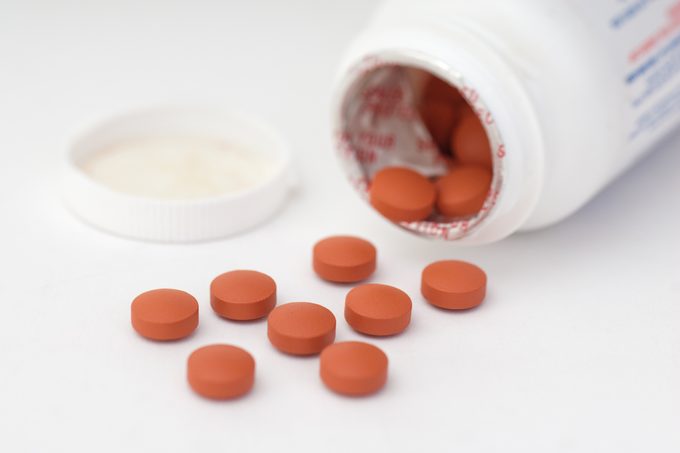Should I Avoid Ibuprofen for COVID-19 Fever?
Updated: Apr. 02, 2020
Does ibuprofen worsen Covid-19 symptoms? Should you avoid it for fever? Experts weigh in
What we know about the novel coronavirus pandemic is constantly evolving: The latest concern is that taking ibuprofen might make Covid-19 worse. France’s Minister of Health, Olivier Veran, raised the alarm in a tweet. This is upsetting because ibuprofen, an over-the-counter painkiller that goes by brand names Advil and Motrin, is a popular way to treat fever, pain, and inflammation. Veran recommended that people use paracetamol—you might know it as acetaminophen (Tylenol)—instead as a potentially safer alternative.
Before you toss your ibuprofen, take a deep breath: So far, the evidence supporting the idea that ibuprofen and or other NSAIDs would harm Covid-19 patients is slim, according to experts and organizations. The World Health Organization (WHO) tweeted on March 18 that it “does not recommend against the use of ibuprofen, beyond the usual known side effects that limit its use in certain populations.” Other experts and organizations have made similar pronouncements.
How the controversy started
The original comment from France’s Veran followed closely on the heels of a brief “Correspondence” article in The Lancet published online March 11.”Reports suggested that anti-inflammatory medications like ibuprofen increase the production of an enzyme, ACE2,” says Eric Ascher, DO, a family medicine physician at Lenox Hill Hospital in New York City. The novel coronavirus uses ACE2 receptors to enter human cells, and this has led people to speculate that ibuprofen and other medications might up the production of the ACE2 enzyme and potentially allow the virus to infect more cells, he adds.
What the experts say
The problem with these predictions, says Dr. Ascher, is that the data is not yet present. “No one knows for certain if more ACE2 means more virus,” he says.
In addition to WHO, the European Medicines Agency issued a statement saying, “There is currently no scientific evidence establishing a link between ibuprofen and worsening of COVID‑19.” It also said it continues to monitor the situation.
As for the data mentioned in the Lancet article, Adam O. Goldstein, MD, professor of family medicine at the University of North Carolina School of Medicine in Chapel Hill, says it’s, “By no means cause and effect. There have been no human trials.”
And Alexa Mieses, MD, a practicing family physician in Durham, North Carolina, adds, “There is insufficient evidence at this time as to whether or not ibuprofen worsens the effects of coronavirus. However, as with any medical treatment, there are always risks and benefits.”
 Ibuprofen carries other risks
Ibuprofen carries other risks
As the WHO statement indicated, ibuprofen can be risky for certain groups of people. “People who are older probably don’t want to take ibuprofen-like drugs because of gastrointestinal side effects which can be irritating and even cause bleeding,” says Dr. Goldstein. Ibuprofen can also potentially worsen kidney disease and increase the risk of a heart attack in people with heart conditions, he adds. “Those are things that we’ve known and we have cautioned people,” says Dr. Goldstein. “If you can take something safer, it’s reasonable to do that.” (Here are times ibuprofen won’t work and may even be dangerous.)
Before undergoing any medical treatment, you should consider the risks and the benefits, says Dr. Mieses, who is also an assistant professor at the University of North Carolina School of Medicine. “The same risks that always apply to ibuprofen (increased risk of bleeding, upset stomach, increased blood pressure, etc.) still apply, regardless of what illness a person may have,” says Dr. Mieses. Talk to your doctor before taking any medication, she adds.
How to manage a fever
“Acetaminophen [Tylenol] is a good fever reducer and for most people, it has fewer side effects,” says Dr. Goldstein. Taking too much acetaminophen, however, can lead to liver failure and even death; always stay within the recommended dosages. The American Diabetes Association also warns that acetaminophen can interfere with some glucose monitoring sensors.
But do you actually need to reduce a fever? There is plenty of data supporting folks who believe you don’t need to suppress a fever (or at least a low fever), the so-called “let it ride” philosophy. “There are many who believe that fever is an inflammatory response and that’s part of the body developing its own immune response,” says Dr. Goldstein. “If it’s not bothering you, it’s unclear how much you try to do that.” About 80 percent of COVID-19 cases will have mild symptoms.
On the other hand, he adds, “If it’s stopping you from getting out of bed and you have a bad headache and no appetite because of that” you may have reason to try to lower it.
You can also do what your grandmother told you to do: Put cool compresses on your head. “When water evaporates it has a cooling effect,” says Dr. Goldstein. It’s one among many old-time home remedies that you might find useful.
Protecting yourself and others against COVID-19
Of course, the best way to treat a fever, COVID-19 related or otherwise, is not to get one in the first place. To prevent infection with the novel coronavirus, practice as much physical distancing as you can, says Dr. Goldstein, who himself is arranging virtual breakfasts and lunches with colleagues and friends. Here are more ways doctors protect themselves from COVID-19.
The other main piece of advice: “Do not go around other people when you’re coughing or have a fever. That is irresponsible and can only worsen what’s happening,” says Dr. Goldstein.
If you have a high fever (generally above 103 F), call your primary care doctor’s office or a COVID-19 hotline. “If you don’t have a high fever and don’t have a cough, just wait it out at home,” he says.

